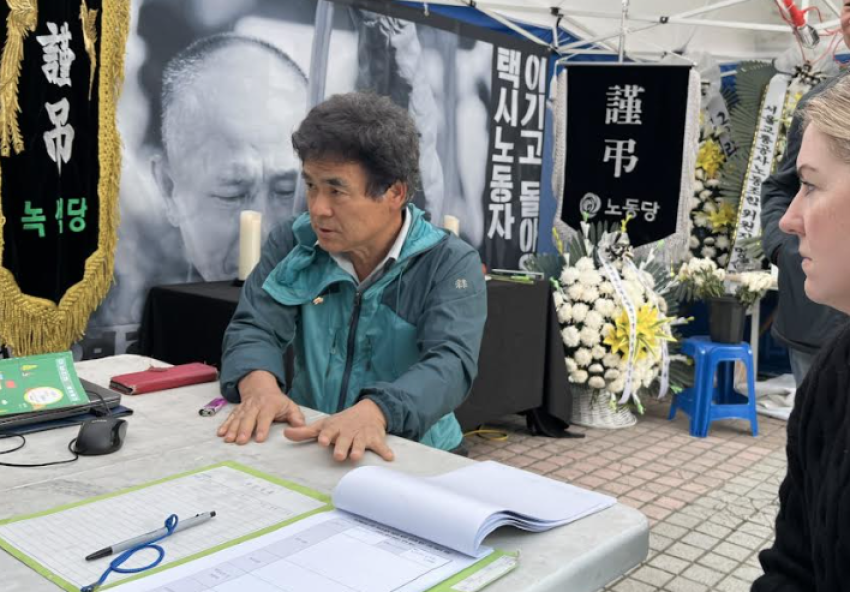
The death of Bang Yeong-hwan, a South Korean taxi driver and trade unionist, has drawn international attention to the harsh and super-exploitative working conditions suffered by the working class in a country that has an international image as a high-tech, relatively developed and wealthy nation.
After a 227-day struggle demanding a full monthly salary system and claiming underpayment in accordance with the laws, Bang, a member of the Korean Public Service and Transport Workers' Union (KPTU), set himself on fire on September 26. He died from extensive third-degree burns on October 6.
Veteran Korean labour and peace activist Shin Joon-shik, who spent many years in Australia, is determined to get Bang’s story out to the West to break through the glossy images manufactured and marketed with K-pop (which has its own dark story of exploitation).
Shin accompanied Lachlan Batchelor, the lead organiser from Union Aid Abroad-APHEDA, and Carolyn Dunbar, who leads the Women’s Team at Victoria Trades Hall Council, on a visit to the shrine for Bang in Seoul, on October 24.
It was an emotional experience for all three and it made Shin even more determined to spread comrade Bang's story.
Bang began his struggle for workers’ rights as a teenage labourer in a textile factory using extremely hazardous materials to produce “Wonjin Rayon”. Wonjin Rayon imported second hand machinery from Japan's Toyo Rayon (now Toray) to produce viscose rayon, but the factory did not set up safety measures to protect workers.
As a result, many workers were exposed to the deadly carbon disulfide, causing more than 300 deaths and hundreds more cases of carbon disulfide poisoning.
Wonjin Rayon reached an agreement with the workers in 1993, but the owners then sold the factory's machinery to China.
The workers informed the Chinese government, but it was in vain. The “devil's machinery” — as the workers dubbed it — was relocated to China.
The lesson here, Shin told Green Left, is that “pollution industries do not disappear; they merely shift borders from one country to another, from developed to developing nations”.
After his experience with the labour struggle at Wonjin Rayon, Bang had great difficulty finding employment. With no educational background or family connections and a history of labour activism, companies were reluctant to hire him.
So he was forced to work as a taxi driver.
Taxi drivers don't get wages; they earn money from fares, after deducting the taxi company's fees. This system leaves taxi drivers with barely enough to live.
Bang and other taxi drivers had to deal with the COVID-19 pandemic and so-called “fare-sharing” systems like Uber and — after Uber was outlawed in 2015 — Kakoa Taxi, a Korean equivalent.
Shin sees this super-exploitation of drivers as a “form of modern serfdom” that benefits taxi companies, and the system has the full support of Korean authorities acting in the service of capitalism.
Bang was dismissed from Haesung Transportation in 2020 after establishing a union in 2019 and participating in anti-fare-sharing and other union activities.
Although he won a lawsuit against his dismissal in the Supreme Court and was given the opportunity to return to work, he was still underpaid.
When Uber was declared illegal, Korean taxi companies forced a modified version of their system on workers. Bang fought, instead, for a salary system for taxi drivers. It was on the 227th day of his one-person protest in front of the company’s office that he set himself on fire.
“Comrade Bang Yeong-hwan lived as a worker in a country that may look glamorous on the surface, but don’t be fooled," said Shin. "South Korea’s corporate leaders like Lee Jae-yong, the CEO of Samsung, can commit all sorts of crimes but only serve short sentences and still meet with presidents to be praised as ‘pillars of industry’.
“Meanwhile, human rights and the dignity of workers are not recognised.”